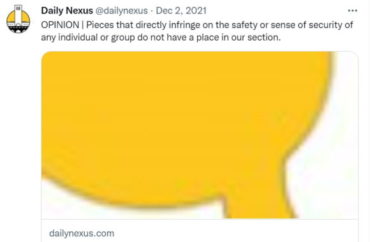
Opinion editors at the Daily Nexus, the student-run newspaper at the University of California Santa Barbara, recently pledged to not publish opinion pieces that make people feel uncomfortable or unsafe.
“In the past, this section’s commitment to free speech has often contradicted this effort to cultivate safe spaces. When articles are repeatedly given consideration despite their potential to directly or indirectly alienate communities in the name of free speech, we fail as a section and a publication as a whole,” stated an open letter, signed by Emily Kocis and Toni Shindler-Ruberg, opinion editors at the Daily Nexus.
“Pieces that directly infringe on the safety or sense of security of any individual or group do not have a place in our section,” the two wrote in their Dec. 2 “Letter From the Opinion Editors.”
OPINION | Pieces that directly infringe on the safety or sense of security of any individual or group do not have a place in our section. https://t.co/QSV253HiKW
— Daily Nexus (@dailynexus) December 2, 2021
The announcement was published the same day that Maya Pacheco, one of the student newspaper’s diversity and inclusion chairs, resigned from the post.
Pacheco cited pushback from the student newspaper staff “against efforts for critical introspection” which “derails from the opportunity to be transparent and understand how to operate within one’s allyship.”
“Endeavors aimed at cultivating social restorative balance require the acknowledgment of hierarchical structures that enable the imbalance of power. Consequently, the overall efforts to police and silence the position are what have led me to my resignation,” Pacheco wrote.
In Kocis’ and Shindler-Ruberg’s letter, they stated that while “we still value being a platform for varying perspectives, we want to ensure that pieces differ in their views while keeping our values of upholding diversity and creating safe spaces for dialogue intact.”
They also vaguely referenced past instances in which the paper’s reporting style, phrasing, and overall atmosphere alienated the trust of specific groups in USCB’s student body.
Kocis and Shindler-Ruberg also argued that the Daily Nexus must publish “diversity not just in content but in who is writing said content.”
Asked to weigh in on the decision to limit publishing opinion pieces that might make some students feel unsafe, Rod Hicks, director of ethics and diversity at the Society of Professional Journalists, said he understands the intent.
He said in a telephone interview with The College Fix that the letter seeks to do something positive by minimizing harm from hate speech toward minority groups. However, he said, it remains unclear what Kocis and Shindler-Ruberg meant by safety.
“We don’t know what safety means, how it is being applied, or what they were considering when they published that line,” Hicks said.
Daily Nexus Editor-in-Chief Katherine Swartz told The College Fix via email the letter was not from the student newspaper’s editorial board, which comprises the editor-in-chief, the managing editor, and the section editors. Instead, the piece was a letter penned solely from the perspective of the two opinion editors, Swartz said.
When asked by The College Fix to point to specific examples of the conflict of freedom of speech and safe spaces, Kocis sidestepped answering the question.
“As you are probably already aware, all of our content is publicly accessible and available to view. Feel free to take a look through it and identify any specific instances that you believe prove your article’s argument as you see fit,” she said via email.
Hicks said publications play two significant roles when managing content: gatekeeping and minimizing harm.
It is normal for publications to leave out some articles since there is not enough space to publish everything, he said. Publications must also balance the public’s need for information versus the prospective harm it might cause to an individual or community, he said.
“Publications have full authority to not publish other people’s hate, and it is the ethical thing to do,” he said.
Hicks said balanced, inclusive coverage is essential to provide the public with the best news.
Hicks pointed to instances like the Kansas City Plaza flood when entire communities were painted negatively by an imbalance of coverage.
“The coverage for the white community showed how they struggled and were devastated, yet publications did not do that for the Black community,” Hicks said. “This left an inaccurate portrait of the community.”
Hicks said journalists need to do a better job of being transparent with the public and explaining their operations.
“We as the press have done a horrible job explaining what we do,” Hicks said. “There is distrust of the press in the Black community because its history of unequal coverage. But even now conservatives distrust the media.”
IMAGE: Harvard newspaper editor drops out of pre-med because of ‘white supremacy’
Like The College Fix on Facebook / Follow us on Twitter






Please join the conversation about our stories on Facebook, Twitter, Instagram, Reddit, MeWe, Rumble, Gab, Minds and Gettr.